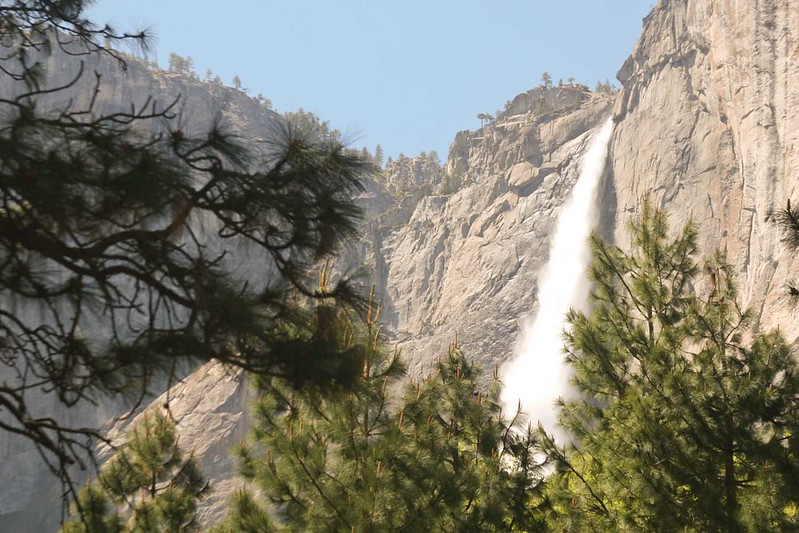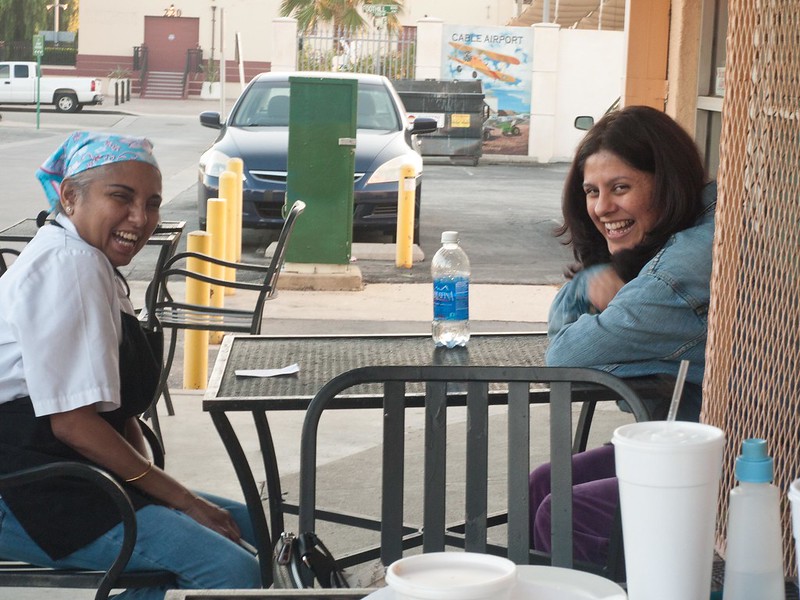Yosemite, of course
Deli V
We just learned that our close friend, Visa Lam, the owner and chef of Deli V in Upland, passed away. Hundreds of other people, I'm sure, have uttered those same words during the past month. She was that kind of person with all of her customers.
Deli V was the first pure restaurant discovery of ours (as opposed to places we tried on Alan Borgen's recommendation) when arriving in Rancho Cucamonga 6+ years ago. My wife was struck by its name in a newspaper restaurant listing. We almost gave up looking for it, so hidden it was from the main street in Upland.
Thankfully we did find it, for Deli V served some of the best panini's, the best cookies, the best brownies, the best soups, the best pies, and the best cake (and the best tuna melt, but that might be just me) in the Inland Empire.
And it had Visa. While she exuded love for her food, and wasn't shy about telling everyone how good it was. Unbridled affection for her customers was her dominant trait. As far as we could tell (to be fair, we never actually went to Deli V during peak times, so it was never particularly crowded while we were there), Visa visited every customer personally. At least, every customer who wanted to became a friend.
Visa was the kind of person who would inspire regulars to arrive, totally unbidden, to plant and maintain the planters in front of the restaurant (we were there once when a couple of regulars started on the task, and I kicked myself for not thinking of it myself).
She was the kind of person who took pride in her perfect health inspection scores. Not just good enough to get A's with a handful of checkmarks for minor infractions, like almost every other restaurant in California. No, Visa had unblemished A's.
She was also the kind of person who would habitually send out samples of soups and desserts just because she was proud of them, thought we would like them, and wanted to see what we thought.
After trying one of her brownies, we decided to bring a half dozen with us on a trip to visit with my wife's family in Mexico (which I happily drove in from Pasadena on my lunch hour to pick up). Brownies (and other deserts) from Deli V became a staple of any time anyone in the family travelled from Los Angeles to Orizaba. Visa even catered most of our most recent Christmas dinner, which we brought with us to the family Christmas in Tijuana. (My nephew has already asked about the brownies for this summer's upcoming trip.)
Since moving to Pasadena several years ago, our Deli V visits were reduced to once a month, in conjunction with a couple of regular errands we run in the Inland Empire. Visiting with Visa was always the highlight for me, as we could easily spend two hours chatting (when she wasn't serving and chatting with others).
I'd give anything for just one more tuna melt.
Click here for a Flickr photo album of some of our trips to Deli V over the past years.
Shopping at Love's
At Johnnies in Culver City
As seen on Huell Howser's show.
The Last Lion: Winston Spencer Churchill: Defender of the Realm: 1940-1965
One of my best book purchases ever was Volume 1 of William Manchester's planned three volume Winston Churchill biography. It was on a remainder rack selling "books by the inch" for $1/inch. I figure Volume 1 added about $1.75 to my purchase.
After a long wait, Volume 3 is finally out, albeit, sadly, after a change of author as Manchester passed away during the process, writing duties taken over by Paul Reid.
It shows. About 25% into the narrative the book becomes little more than a list of activities with little overall storytelling. To be sure, this characteristic turns many biographies into a slog to the finish, but here more than most.
The book leaves the reader wondering what about Churchill did to make him so beloved, at least after the initial London blitz. This is a man who was offered a Dukedom because a mere knighthood didn’t seem generous enough, a man with his own monument in Westminster Abbey. Yet we are not given any feel whatsoever about why. Perhaps just being PM during the war was enough, but something made him the most important person of the first half century, and then the entire century. This book does not give a feeling for what that something was (again, at least after his spirited heroism during the initial blitz...the narrative of which might well have been written primarily by Manchester).
Immediately after V-E day Churchill was resoundingly and overwhelmingly swept from office. Why? Of course sensible hypotheses leap mind, but we read the book to learn what knowledgeable researchers conclude, not what we assume.
(Presumably) relatedly, early on in the war, after the death of Neville Chamberlain, Churchill accepted the Tory party leadership, even though he was PM of a bi-partisan wartime government. The book describes this as the worst political decision of his life, but doesn't even try to link it to anything. Presumably it played a crucial role in the disastrous 1945 elections. As to what that role was, the reader is left to his own prejudices.
Despite the above criticisms, I'm thrilled that this book was finally completed and released, even if a substitute author had to be brought in. The world would have been the worse without it.
Sebastian
A delightful piece of 1953 dropped into 2014 Ventura County.
That's Santa Paula, CA. It could easily be used by as the backdrop for an Andy Griffith remake (well, but for the 30% Spanish language signs filling downtown). There's even a department store the size of an urban McDonald's with a telescope in its front display.
I've always wanted to try out the Chili Hut, but we take Bo and the Hut has no outdoor seating, so we end up at the utterly out of place but wonderful cajun bistro that's up the street.
Good thing I only come here for Diet Pepsi
Does Economics have a conservative or liberal bias?
Chris House argues that Economics has a conservative bias:
"In economics it seems like the facts and the analysis have much more of a conservative slant than a liberal one. It really is true that taxing labor income reduces labor supply (a little). It really is true that extending unemployment benefits encourages people to delay looking for a job (a little). It really is true that taxation can reduce employment demand; that excessive business regulation seems to be correlated with reduced levels of business formation; that union concentration has a detrimental effect on industries and on and on. "
Matt Yglesias lists points that he believes imply that basic Economics has a liberal bias:
- Governments (typically through central banks) need to manage the demand level of national economies to prevent catastrophic recessions and mass unemployment.
- Absent carbon pricing, a market economy will massively overproduce greenhouse gases.
- Many industries, such as broadband Internet, are "natural monopolies" where an unregulated market will lead to higher prices and less investment than is socially optimal.
- Due to asymmetrical information, consumers in a market economy will be unable to bargain effectively with doctors and other providers of health care services.
- Due to adverse selection, consumers in a market economy will be unable to effectively insure themselves against health risks.
- Due to the declining marginal utility of money, taking $100 from a rich person and giving it to a poor one will increase human welfare.
- Increasing the number of immigrants, raising taxes on the rich, and making Social Security benefits more generous will make almost everyone better off.
I basically agree with both authors on every one of these observations (with caveats on a few*). Econ 101-type analysis does make almost every single one of these points.
But notice that House’s observations basically come from the trunk of Economics, which I take to be spinning out of the observation that voluntary transactions are mutually beneficial thereby creating the invisible hand that leads people to make the world a better place while trying to do nothing more than make themselves better off.
Yglesias’ points, for the most part, reflect conditions under which transactions mutually beneficial to the participants do not, for one reason or another, make the world better off (i.e., "market failures”). The points are all fine, if in some cases overwrought, but unless Matt wants to argue that they completely overwhelm the trunk of Economics, then Economics has a "conservative" bias.
I’m reminded of an interview with an urban planner of some sort who described letting all of the inhabitants of a city trade with each other however the want, put stores wherever they want, and so on, as “the worst possible thing to do.” Not something that can in some cases lead to some negative consequences that might be able to be addressed by some government policy, but, rather, “the worst possible thing to do.”
I can think of something worse. Giving a collection of urban planners carte blanche to dictate how and where individuals interact with each other without allowing for learning and adjustments on a micro level would be worse.
* A few observations about Yglesias' points:
- The basic Economics that I took did not teach that Governments need to manage demand. It did teach about theoretical Keynesian countercyclical policies that Governments could attempt to employ to reduce the scope of the business cycle. It did not necessarily give much hope that real flesh and blood governments would be able to implement these policies in a way that does more good than harm.
- Technically, Econ 101 assumes that interpersonal utility comparisons are impossible, so it cannot teach that a policy which reduces a rich person’s wealth by $100 while simultaneously increasing a poor person’s wealth by $100 necessarily increases human welfare. But it certainly suggests such a thing.
- For similar reasons, in no way does Econ 101 teach that raising taxes on the rich or making Social Security benefits more generous will make almost everyone better off. I honestly have no clue where Yglesias gets that idea, unless it is generalized from the $100 from rich to poor argument. In that case, at worst Econ 102 is going to get into disincentive effects of taxation and the fact that Social Security is fundamentally a transfer from the middle class to the middle class.
- Finally, we Austrian-types tend to view the world as a sea of ignorance surrounding little blobs of knowledge, and the Economic Problem as how to manage to bring these little blobs of knowledge to bear on decisions. In some sense, asymmetrical information is a characteristic of every transaction. Asymmetrical Information is interesting and worthy of study (more so that a lot of other things that get studied). But it’s hard to get as worked up about it as the left does.
OC Fair
Hot dogs and Fries
At the border
Border nurse
Future Tacos
They do them well in this Tijuana stand.
Econ 101 and tech commentators, part 1 (Amazon monopoly edition)
As an undergraduate one of my highly science oriented friends explained how frustrated he was with Econ 101 because there were so many places in which calculus so obviously belonged but couldn't be used because the class was not geared towards that kind of audience.
I feel the same way when John Gruber and Marco Arment (or any of a large number of tech commentators) discuss Amazon and ebook "monopolization." There are gaping holes in the discussion where Econ 101 belongs but is absent.
Gruber and Marco take it for granted that Amazon's now defunct $9.99 pricing for almost all (popular) Kindle books, even if Amazon itself paid $12.50 to the publisher for the book, was a "textbook example of predatory pricing," with the ultimate goal, presumably, being Amazon left as the only ebook provider getting to raise prices to monopoly levels.
Missing is any consideration of what it takes to enforce a monopoly. Anyone arguing that Amazon is capable of establishing a long standing monopoly by driving out competitors with below cost prices has to explain how Amazon could thwart new entrants after raising prices to monopoly levels. It's literally impossible to say anything useful without first addressing this issue. Marco makes some hand-waving references to the need to buy a dedicated device (i.e., the Kindle), but in a world awash in iPads, Nexii 7's, etc, etc, that's not a very compelling argument.
I have no special insight into Jeff Bezos' psyche. Perhaps he is trying to create a monopoly by driving all competitors out with temporary below cost pricing, although I suspect he's much too smart for that. Nonetheless, from a public policy perspective, the relevant question isn't what he is trying to do, but what he can do. Creating a long-term monopoly in ebook sales just isn't in his arsenal.
FWIW, I've always assumed that Amazon's strategy is some mixture of three things:
1) Establish ebooks in the consumer mind as a standard mechanism for buying books. Before the fanfare surrounding the Kindle (and, later, the iPad), ebooks were a decided niche product. Now they are a consumer standard. It seems reasonable to believe that it is worth it to Amazon to "pay" readers in the form of subsidized book purchases for a time to help develop that market.
2) Establish Amazon as the first place a book reader would think to go to to buy ebooks.
3) Illustrate to the book publishers that lower revenue from lower book prices would be more than offset by greatly increased book sales. For me, anyway, the $9.99 price point was just on the right side of the impulse purchase line to make me buy on a whim. But I tend to buy a lot of books.
Personally I think that book publishers are too frightened of innovation and don't want to be shaken from their comfortable "release a cheap, paperback edition after all the highly motivated buyers already shelled out for the hardback" model. I think Bezos is/was trying to slap them in the face to recognize a new, more profitable, reality…to be sure, one that also includes lower wholesale prices to Amazon, but still involves more income to book publishers through much higher book sales. (In other words, I think book publishers are mistaken about what is in their own best interests. No, I don't think government policy should be made on this basis.)
Of course, those basic facts can be fit into two slightly different stories, each of which attempts to answer the biggest question that must be addressed: Why would publishers object so strenuously to a reseller selling books for less than the price the resellers have paid for those books? Normally one would expect the publishers to sit smugly in the corner wondering how they got so lucky.
Story 1) Publishers currently release hardback editions in advance of paperback editions to gain added revenue from buyers willing to pay extra for the benefit of reading the book now rather than 6 months from now. This is an important aspect of the book publishing business model that ebooks disrupt. I imagine publishers are struggling to figure out how to fit ebooks into their decades old hardback-paperback release schedule. Amazon seems to have one thought about how they should fit in, and that thought seems to come pretty close to destroying the model entirely. I don't know how the publishers think that ebooks should fit in. I suspect they still don't know themselves, but I also suspect that they would like to make that choice themselves, rather than cede the choice to Amazon.
Story 2) The ubiquitous monopsony story. Amazon becomes by far that largest seller of ebooks, which gives it some degree of monopsony power over the publishers. One can easily imagine publishers being extremely concerned about this, but is this a bad thing for consumers?
Amazon's hypothetical monopsony power would exist only because the publishers have some monopoly power themselves. Amazon can, in this story, be seen as form of a consumer cartel negotiating better prices from publishers, which sounds good for consumers.
But perhaps not. Publishers have their monopoly power because of copyrights granted by the government. By negotiating away some of the monopoly value of the copyright, this "consumer cartel" diminishes the value of the copyright, thus, reducing the production of books.
I doubt that the government has the knowledge necessary to determine which of these most accurately describes reality, nor, in the case of the monopsony story, that it has the ability to determine whether Amazon monopsony power over publishers is good or bad for consumers. So, I think the government should just leave it alone to play out on it's own.
Upland
East Pasadena
Union Station
LA
I just watched an Eggleston documentary
Outliers
Outliers is a nice collection of marginally related, well written (Malcolm Gladwell, natch), stories that are ostensibly tied together by their ability to disprove the notion of a "self made man".
It's a little difficult to tease out what Gladwell thinks a "self made man" would look like, but we know what he doesn't look like: any existing human being with a family history that influenced his life. You're not a self made man if you were raised in an environment which valued education or entrepreneurship. You're not a self made man if you were a life-long computer nerd in your mid twenties at the dawn of the micro-computer revolution and became successful in that industry. You're not a self made man if you were unfairly shut out of the "best jobs" because of your ethnicity only to end up with a "second tier" job that, because of changes in society, ended up being much more lucrative than ever predicted.
What Gladwell doesn't do it look at the history of similar people with similar backgrounds. Joseph Flom presumably wasn't the only Jewish law student from an immigrant, garment industry family who couldn't get a job at the top law firms. Why was he so successful and not the others? More relevantly, why did some of them become at least reasonably successful, while others gave up (if any did)? What was it about Bill Gates' nature that drove him to sneak out of the house at 3:00am to code in the University of Washington Academic Computer Center that was not the nature of other nearby children?
Gladwell's argument is that Flom and Gates wouldn't have been able to do what they did had a fairly specific set of things not happened in their lives, but he doesn't investigate people for whom those or similar sets of things did happen. In science this is referred to as "survivor bias", and Gladwell is assuredly familiar with it.
"Self made man" is a trite, wince-inducing phrase that anyone should be embarrassed to apply to himself. But let's not pretend that all life is random chance. Or, if you want to make that claim, you have to do a better job than Gladwell does here.
In the end the book works extremely well at illustrating a point that precious few ever doubted: That the exact path of one's life is heavily influenced by family environment and elements of random chance. It that regard it's a kind of "Connections" for the social psychology set. But the stories themselves are best read as enjoyable, unrelated, long form magazine pieces.
















